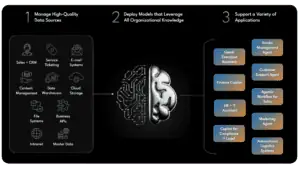Domain-Specific AI: Smarter, Safer, and Built for Your Industry
Today, there is an AI for nearly everything. From simple tasks to solving problems that are unique to your domain, how can AI models improve industry-specific metrics?
What are Domain-Specific AI Models?
Domain-specific AI models are fine-tuned on industry data. Contrary to general-purpose Large Language Models, they are precise, know the specifics of your industry, and context-aware. Generic LLMs often misinterpret specialized workflows, leading to unexpected outcomes and poor performance in high-stakes domains.
So, enterprises need AI models that are trained specifically on quality data and specific industry use cases. Making AI models aware of an enterprise’s context helps them solve common problems in their domain during training itself.
What are the Benefits of Industry-Specific AI Models?
Domain-specific AI models understand niche workflows. When enterprises deploy them, it increases efficiency, trust, and makes the AI models reliable in the long run. Integrating them improves –
- Precision: These AI models understand and use domain-specific language, processes, and reduce misinterpretation.
- Scalability: Serves as a foundation for multiple workflows within a sector. Lowers the cost of ownership by enabling faster retraining and deployment.
- Governance & Trust: Embeds regulatory requirements directly into workflows. Provides auditability and transparency to meet evolving standards.
- Efficiency Across the Value Chain: Faster time-to-value through targeted training and reduced post-processing. Filters noise to identify relevant insights quickly.
- Competitive advantage: Speeds adoption by aligning with industry-specific needs. Unlocks new services and differentiates enterprises in the market.
6 Best Practices for Implementing Industry-Specific AI Models
Building industry-specific AI models needs alignment with business priorities and enterprise-level complexities. The following practices help enterprises reduce risk, accelerate adoption, and maximize long-term value.
1. Define critical use cases before model selection
Identify the business problems where AI can create measurable value and which model is the best fit for your enterprise.
Align model design with ROI and long-term goals to avoid over-engineering generic solutions.
2. Leverage hybrid training data
Combine real-world datasets with synthetic data to capture both everyday and rare edge-case scenarios.
Use synthetic data techniques to address data limitations and unavailability in regulated or sensitive fields like finance or healthcare.
3. Embed explainability and compliance from day one
Incorporate explainable AI (XAI) frameworks that provide transparent reasoning for model outputs.
Include compliance checks to align with sector-specific regulations like HIPAA, GDPR, FINRA, etc.
4. Select the right build strategy
Evaluate whether to fine-tune a pre-trained foundation model or to develop a custom model from scratch.
Decide based on data availability, domain specificity, and long-term scalability requirements.
5. Adopt robust evaluation metrics
Go beyond accuracy to measure fairness, bias, precision, recall, and total cost for real-world reliability.
Set continuous monitoring triggers to detect drift and performance degradation over time.
6. Plan for integration with existing workflows and enterprise systems
Ensure models can plug into existing data pipelines, decision systems, and APIs with minimal disruption.
Design deployment strategies that allow for human-in-the-loop oversight during critical decisions.
Use Cases for Domain-Specific AI Models for
1. Healthcare, Life Sciences & Pharmaceuticals
- Precision Care in the healthcare industry helps professionals develop predictive diagnostics. AI made for healthcare can analyze patient data to help doctors choose better treatments faster, without a lot of guesswork.
- Faster Drug Discovery is possible with accelerated clinical trials and molecular modelling. In life sciences. AI models can shorten R&D cycles by simulating outcomes of the research and designing optimized trials.
- Operational Efficiency in hospitals to enable smarter scheduling and hospital resource planning. Optimized workflows reduce wait times and increase the number of patients that receive care.
- Compliance by Design for built-in adherence to HIPAA, FDA, and data governance. Embedding regulatory requirements ensures trust and safe deployment.
2. Banking, Financial Services & Fintech
- Fraud Protection for real-time detection of suspicious transactions. AI trained on domain-specific patterns helps reduce financial risk.
- Smart Decisions allow for AI-powered credit scoring and risk modeling to protect financial institutions against risk and defaults.
- Customer-First Approach creates hyper-personalized banking experiences. AI models can curate customized product offers and adaptive advisory services to improve client experience and engagement.
- Governed Finance makes explainable and audit-ready decision-making possible. AI outputs can be traced to build stakeholder trust.
3. E-Commerce, Manufacturing & Transportation
- Predictive Uptime by proprietary AI models helps enterprises optimize maintenance cycles and reduce downtime. This helps them anticipate equipment failures before they happen.
- Agile Supply Chains optimize inventory and demand forecasting with AI models trained for logistics. This makes enterprises adaptive to unexpected disruptions and market shifts.
- Smart Operations with domain-trained AI models to optimize inventory management and order fulfillment for faster shipping and improved customer satisfaction.
- Safety & Sustainability enable worker safety monitoring and energy optimization. AI models trained specifically around safety can cut risks and support ESG goals.
Key Challenges You’ll Face (and How to Overcome Them)
Data Availability & Quality
- Enterprises often face fragmented, siloed, or limited datasets that produce biased or unfair outcomes.
- Domain-specific data annotation and bias testing can help create precise, diverse, and reliable datasets to overcome skewed outcomes.
Regulatory Compliance
- Domain-specific rules around data privacy, usage, and accountability make compliance complex and high-stakes.
- Compliance-focused data services build audit-ready, trustworthy models to make AI adoption faster amid strict regulations.
Integration Complexity with Legacy Systems
- Many enterprises rely on outdated or rigid infrastructures that make connecting modern AI workflows costly and slow.
- Custom tooling and platform engineering enable smooth integration with legacy systems.
Ensuring Long-Term Adaptability
- Proprietary or closed architectures can lock enterprises into inflexible systems, limiting innovation as technologies evolve.
- Open standards and portable data pipelines future-proof AI investments and enable scalability.
Does Your AI Model Know Your Industry?
Domain-specific models consistently outperform generic AI in enterprises by delivering higher accuracy, trust, and relevance. They enable multi-modal integration, continuous learning loops, and AI agents with embedded domain expertise that autonomously execute complex tasks.
Partner with Innodata to design, train, and deploy AI models that understand your industry and your enterprise. Connect with an Innodata expert today.

Bring Intelligence to Your Enterprise Processes with Generative AI.
Innodata provides high-quality data solutions for developing industry-leading generative AI models, including diverse golden datasets, fine-tuning data, human preference optimization, red teaming, model safety, and evaluation.

Follow Us



